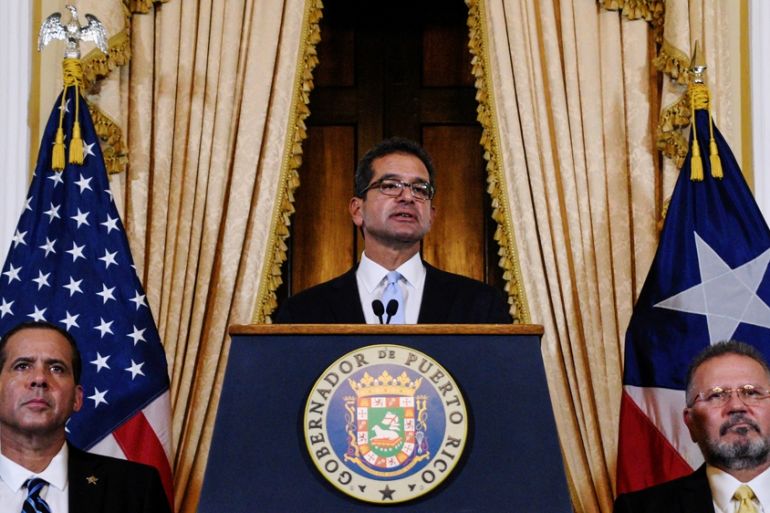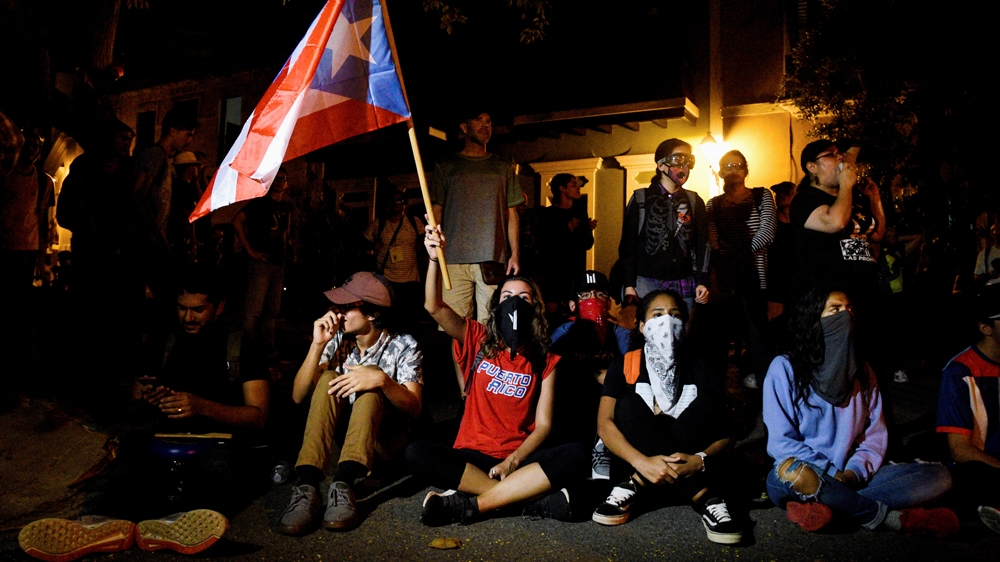Puerto Rico names new governor as uncertainty, protests continue
Pedro Pierluisi is next in line to be governor but the Senate must approve his appointment.

Veteran Puerto Rico politician Pedro Pierluisi has been sworn in as governor after his predecessor Ricardo Rossello resigned as promised.
Rossello stepped down in response to weeks of protests over mismanagement and a series of leaked obscenity-laced chats, in which he and advisers – who have also resigned – made fun of women, gay people and hurricane victims.
He handpicked Pierluisi to succeed him, but Friday’s development throws the United States territory into a period of fresh political chaos amid accusations that Pierluisi does not represent change.
The governor of Puerto Rico is the head of government in the territory, and since 1948 has been elected by the people of the island.
Four hours after he was sworn in, San Juan Mayor Carmen Yulin Cruz said on Twitter that the municipality at 8am (12:00 GMT) on Monday would challenge Pierluisi’s new position.
Meanwhile, a well-respected lawyers’ organisation, the American Civil Liberties Union of Puerto Rico National Chapter (ACLUPR), accused Pierluisi of “hijacking the constitution”.
After taking the oath at his sister’s house, Pierluisi emerged at the governor’s residence to address the press and promised only to serve as governor until a Senate hearing on his nomination, which was moved up to Monday.
If the Senate votes no, Pierluisi said he will step down and hand the governorship to the justice secretary, Wanda Vazquez, the next in line under the constitution.
Nothing more was heard from Rossello.
Pierluisi said he was “fully capable and authorised to act, but Senate will have its say”.
Depending on the Senate’s action, his tenure “could be very short-lived”, he said.
He did not plan to move into the governor’s mansion until after the vote. He also said he would avoid any major changes and concentrate on meeting with top government officials.
“The prevailing mood in Puerto Rico is that of a celebration, due to the definitive exit of Rosello. It is a significant achievement and is valued that way,” Carlos Rivera-Lugo, an independent researcher and scholar, told Al Jazeera.
“But assemblies are being held to agree on actions against the oath of Pierluisi. In that sense, the current feeling is that the struggle continues … the oath of Pierluisi is perceived as an arbitrary act of force.
“I believe that Puerto Rico currently lives under a state where the law follows the fact.”
Rossello dismissed the need for the House of Representatives and Senate to confirm Pierluisi, saying it was an appointment by the governor when the Senate is in recess.
‘Clean the entire house’
The down-to-the-wire manoeuvring risked political anxiety and sowed pessimism among Puerto Ricans about the fate of their island, which has been battered by years of bankruptcy and Hurricane Maria in 2017, one of the worst natural disasters in US history.
Days ago, there was jubilation over the success of the popular movement to force Rossello out of office.
But on Friday, Puerto Ricans bemoaned the confusion over who would fill the role of governor.
“We are demanding a real and radical change in this country, in the way that politics are done, we didn’t demand the resignation of a corrupted government, for having another equally corrupted, we are demanding a real alternative,” Gabriel Nasario, a protester in Puerto Rico, told Al Jazeera.
|
|
Senate President Thomas Rivera Schatz, a member of Rossello’s party who is seen as a possible future governor, criticised Rossello for naming Pierluisi and appeared to hint at fighting the succession plan.
“He never regretted anything,” Schatz said of Rossello in a post on Facebook. “He did not respect the demands of the people. In fact, he mocked them, using new accomplices.”
Schatz said that order and morals will prevail: “No one should lose faith.”
Hundreds of protesters marched to the governor’s residence, the Fortaleza on Friday, banging pots and drums and singing the national anthem.
Demonstrators had not been highly critical of Pierluisi before but were angered by the succession process and Pierluisi’s ties to a federal control board that promoted cutbacks on the island.

“There might not be a temporary solution that is going to be seen as adequate,” Judith Berkan, a constitutional expert in Puerto Rico, told Al Jazeera.
“But I think that [due to] the way protests have gone, and particularly the participation of an otherwise apathetic young generation, we will see long-term fundamental change.”
Rosa Cifrian, a 47-year-old professor of nursing, said Pierluisi would not be a good governor “for the people”.
“He’ll keep promoting policies of austerity, cutbacks, everything that the board says,” she said.
By late Friday night, police warned the protesters that they would fire tear gas if needed as some chanted “Guilty of the crisis! Pierluisi! Pierluisi!”.
“The government must listen, we want a complete change, better governors, people that really can connect with the necesities of our people,” said protester Jennifer Garcia.
Controversies, conflicts and challenges
Politicians and Pierluisi himself have expressed concern that continuing political uncertainty could damage Puerto Rico’s efforts to get federal funds to recover from the hurricane and confront the economic crisis.
Several legislators have accused Pierluisi of a conflict of interest because he worked for a law firm that represents the control board, which has repeatedly clashed with local officials over demands for austerity measures.
Pierluisi, whose brother-in-law is the board’s chairman, tried to dispel those concerns in his opening remarks.
“Who better than me to advocate for our people before the board? Who better than me to facilitate the process that will force the board to leave? That is what we all want,” he said.
The board was created by the US Congress to oversee the restructuring of more than $70bn in public debt after Puerto Rico declared a form of bankruptcy.
Pierluisi told politicians that he is against several austerity measures demanded by the board, including laying off public employees and eliminating a Christmas bonus.
He said he supports public-private partnerships and the privatisation of the island’s public power company.
“The people want a change, and I don’t blame them,” he said.
A key obstacle for Pierluisi has been Schatz, who wants to run for governor himself next year.
Several legislators have said they prefer Schatz over Pierluisi, but the Senate leader is a powerful figure deeply associated with Puerto Rico’s political and business elite, and his elevation to the governorship could reignite popular outrage.
Pierluisi was Puerto Rico’s non-voting representative in Congress from 2009 to 2017 and then ran against Rossello in the 2016 primaries and lost.
He also served as justice secretary under Rossello’s father, Pedro Rossello, when he was governor.
Additional reporting by Elizabeth Melimopoulos.